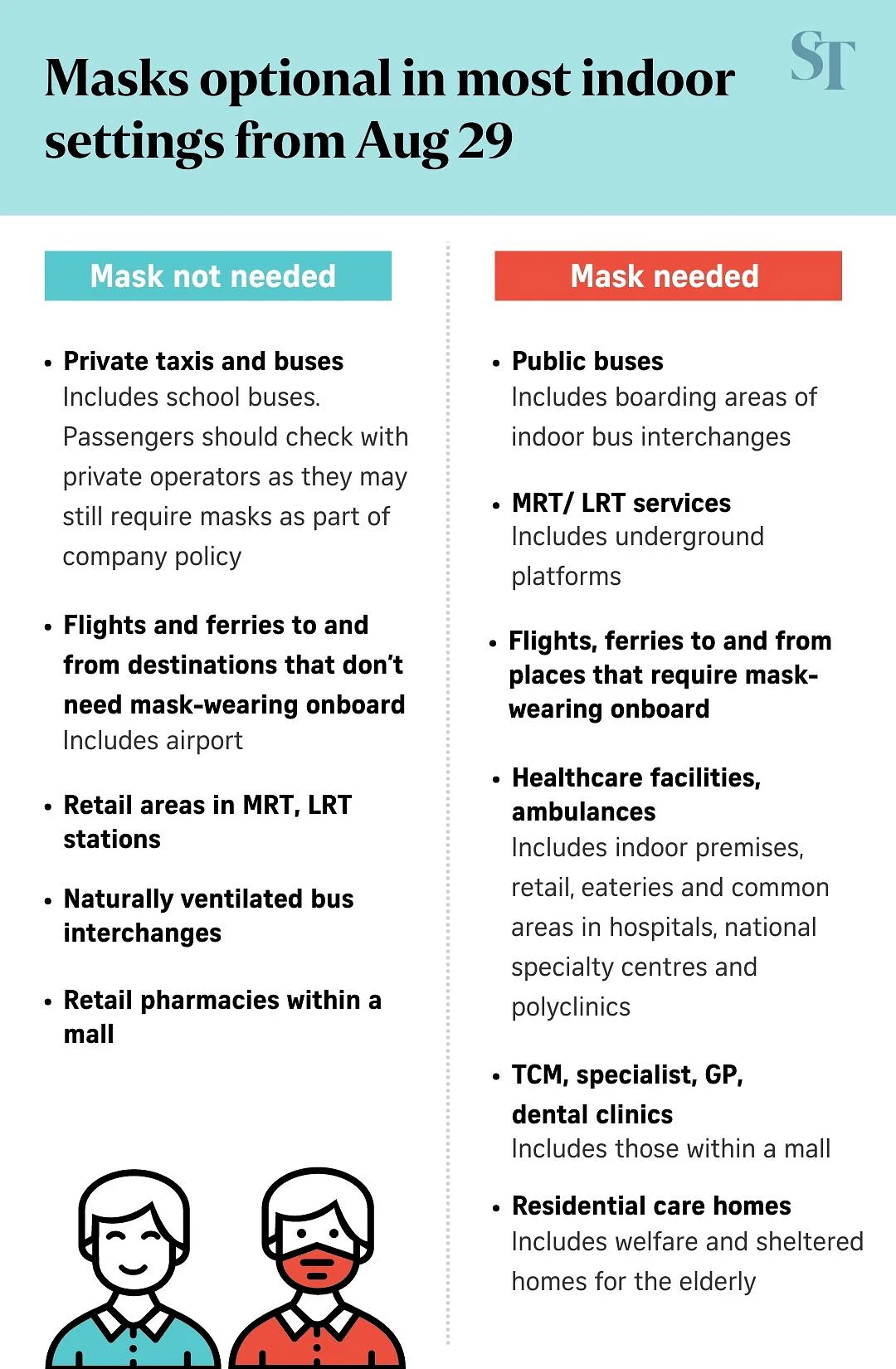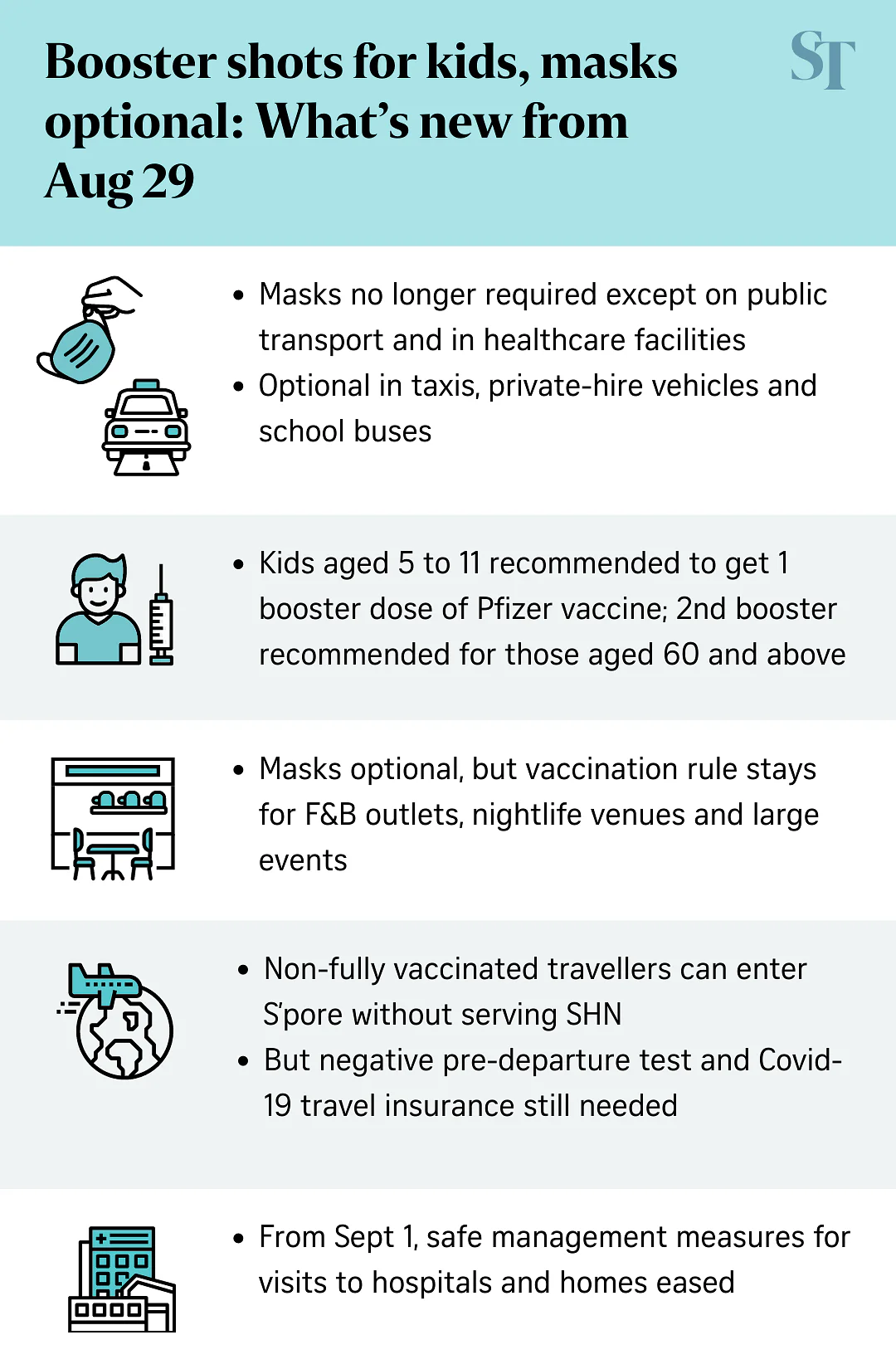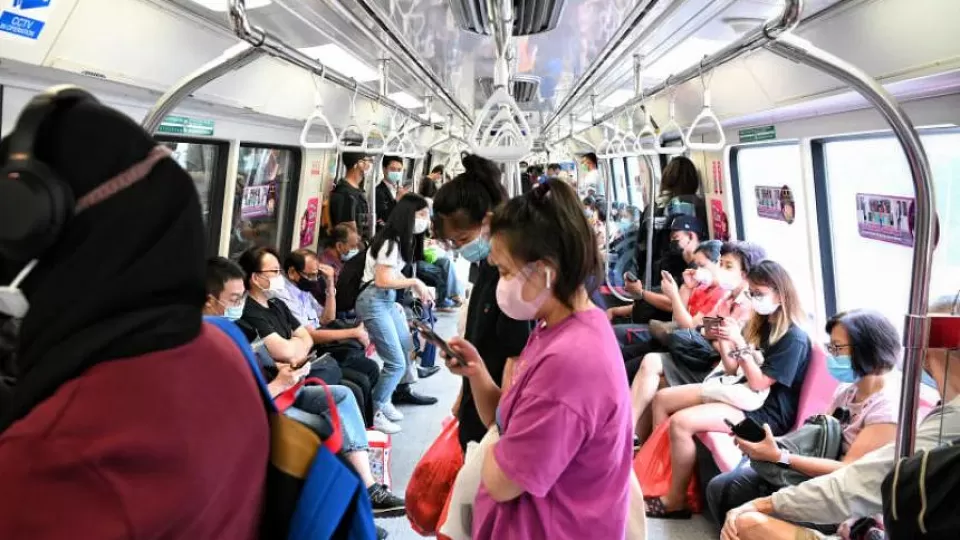August 24, 2022
SINGAPORE – Masks will not be required in most indoor settings from Monday (Aug 29), as Singapore takes a significant step towards living with Covid-19.
Deputy Prime Minister Lawrence Wong on Wednesday said masks will be mandatory only in two settings, the first being healthcare facilities, residential care homes and ambulances, as well as indoor premises within hospitals and polyclinics.
They will also be required on public transport – the MRT, LRT, public buses and indoor facilities such as the boarding areas at bus interchanges and MRT platforms.
Mask-wearing in the airport and on private transport modes such as school buses, private bus services and taxis will be optional.
The further easing of Covid-19 rules comes as the population has become more resilient against the virus, due to high vaccination rates and more people getting infected, said the Ministry of Health.
The number of infections has also declined steadily, while the number of daily hospital cases has halved from more than 800 in July to below 400.
Mr Wong cautioned, however, that while the pandemic situation is much better today, Singaporeans must be mentally prepared for any sudden change as the next Covid-19 variant could be more aggressive and dangerous.
Health Minister Ong Ye Kung said at a press conference that Singapore should prepare itself for a “northern hemisphere winter wave” at the end of the year, which the United States, United Kingdom and Europe are all bracing for.
Vaccination remains the primary line of defence, said the Covid-19 multi-ministry task force, which is co-chaired by Mr Wong, Mr Ong and Trade and Industry Minister Gan Kim Yong.
The Government will roll out boosters for children aged five to 11 in the fourth quarter of this year and is considering vaccines for infants and younger children, said Mr Ong.
He noted that almost 80 per cent of the population have taken their booster shots, a key reason why Singapore was able to ride through the BA.5 variant wave without tightening safe management measures and having hospitals overwhelmed.
An estimated 70 per cent of the population have been infected with Covid-19, he added. The proportion of cases that are reinfections has increased from 2 per cent to 3 per cent to about 5.5 per cent now.
Said Mr Wong: “Vaccinations are still the best way to protect ourselves against severe disease from Covid-19. But we are reviewing our vaccination policy to transit to a system where we keep our vaccinations up to date.”
With the Expert Committee on Covid-19 Vaccination recommending a first booster for children aged five to 11 years, the Government will offer jabs to this group in the fourth quarter of the year, when exams are ending or over.
There will be five dedicated vaccination centres across the island to administer boosters to them.
A decision on recommending vaccinations for children aged six months to five years is expected soon, Mr Ong added. If approved, it will be timed together with the booster exercise for children aged five to 11.
Mr Ong said the Government is giving very early notice of plans for these two groups as parents are concerned about the safety of their children.
The expert committee has also recommended a second booster for people aged 60 and above. This group was previously only offered to take it, if they wished to.
There is no change to the vaccination-differentiated safe management measures, Mr Wong said. Currently, vaccination status checks are required for large events with more than 500 people and for all those dining in at food and beverage establishments.

Masks will not be required in most indoor settings from Aug 29, 2022. ST PHOTO: KUA CHEE SIONG
Border measures will be eased, as non-fully vaccinated travellers entering Singapore will not need to undergo a seven-day stay-home notice (SHN) upon arrival from Monday.
Such travellers will not have to take a polymerase chain reaction test upon exiting SHN as well. They will continue to need a negative pre-departure test taken within two days of departing for Singapore.
Meanwhile, non-fully vaccinated long-term pass holders and short-term visitors aged 13 and above will not have to apply for entry approval to enter Singapore from Monday.

Mr Wong also said the multi-ministry task force will not be stood down, as the pandemic situation could change suddenly.
The task force will continue to monitor the situation closely and has plans in place for various contingencies such as scaling up healthcare capacity and stepping up vaccination operations when needed, he added.
“I hope we will not need to invoke these measures again,” he said, referring to safe management measures. “But we know from past experience that this is a tricky virus, and we have to expect the unexpected. So let’s all be prepared and maintain our solidarity, trust and unity to get through this pandemic together.”



